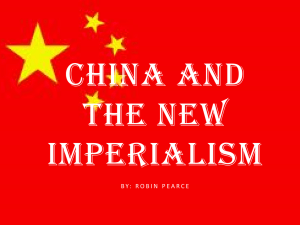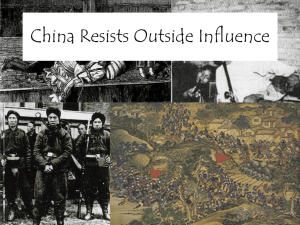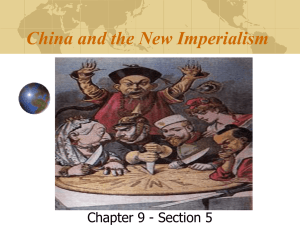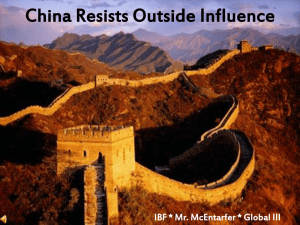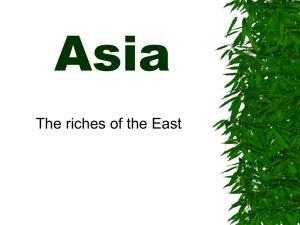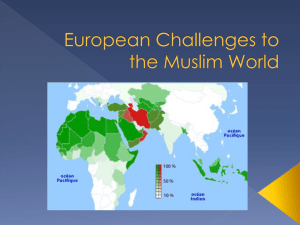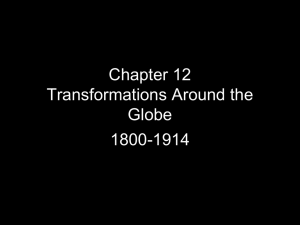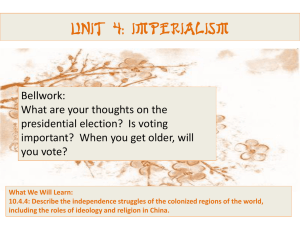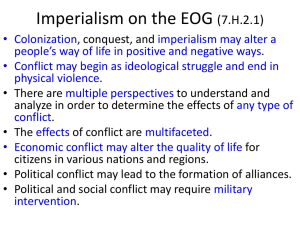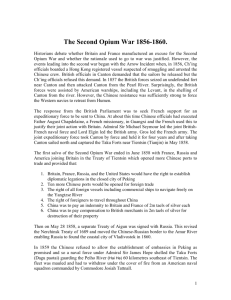Imperialism and China
advertisement
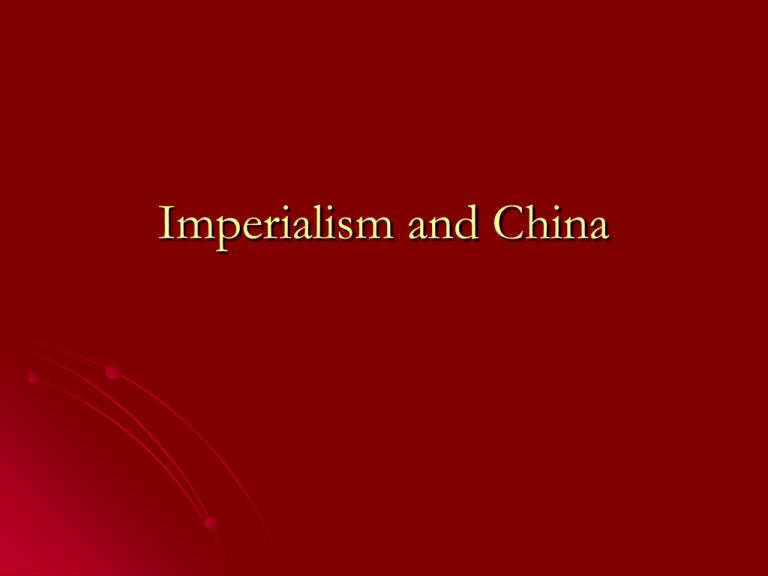
Imperialism and China China In the 1790’s China was not interested in western influence. China refused western technology. China was self-sufficient. Good agriculture Extensive mining and manufacturing Finely produced goods Porcelain, cottons, and silk China wanted to remain isolated China The Chinese did allow the rest of the world (Europe) to trade in one port city (Canton) The Chinese had strict guidelines on what could be bought and sold in Canton Europeans powers (The British) saw China as a place of vast wealth (Raw materials and markets) Soon not only were British trade ships sailing into Canton harbor but also British warships The British were going to open up trade one way or another The Opium Wars The British had to find something that the Chinese wanted. In the late 18th century the British stated importing opium from India. By 1836 Britain was making 16 million dollars off the sale of opium to China. Opium Wars Opium is highly addictive and by 1836 about 12 million people were addicted to the drug. The drug caused moral and social problems in China. The Chinese government tried to outlaw the sale of opium. When Britain refused China seized the opium in Canton in 1839 The British became angry that the Chinese had taken their goods and both countries went to war Opium Wars The wars lasted from 1839 to 1841. The British won easily because of their military and naval power. Britain forced China to harsh treaties. The treaties were seen as the “unequal treaties” The British were now given rights to trade anywhere in China And the right to create more opium addicts Opium Wars Treaty of Nanjing Britain forced China to Pay for all war cost. Open all ports to British trade. Give Britain the island of Hong Kong. British citizens living in China lived under British law and not Chinese law. Opium Wars The Chinese resented the British. The opium trade continued. Britain now had a sphere of influence in China. The Taiping Rebellion By 1850 China’s population had grown by 30% however food production had dropped off. The people of China were starving. The Chinese Government had become corrupt. Many were upset at the lack of morals and the opium addiction in China. The population began to rebel against the ruling Quig Dynasty. China Hong Xiuguan Believed that his own personal vision of Christianity would save China. Believed if the people followed him all would share in China’s wealth. Taiping = Great Peace China Hong’s army was made up of most peasants. By 1853 he controlled the city of Nanjing and later large areas of southern China. Finally in 1864 the French and British armies put down the rebellion. At least 20 million people were killed. Large amounts of farm land were destroyed. The rebellion weakened China and the Chinese government. China By the 1870’s China had a weak military. a government that was seen as corrupt and unable to rule. Lacked technology to keep up with western nations now trading with China. American Intervention The U.S. was trading with China. The U.S. was worried that western powers would cut up China like Africa. If this happened there would be restrictions on trade. The U.S. started the Open Door Policy. China should be open to trading by all countries in the world. It kept China from being colonized and gave the U.S. rights to trade with China. Boxer Rebellion Some Chinese became upset with foreign intervention in China. Poor Chinese resented special privileges given to foreigners. Many Chinese disliked Christian Chinese. Many felt that the ruling Empress Dowager needed to be removed from power Boxer Rebellion A society called the Boxers began to call for reforms in China. In 1900 in Perking Shouting “Death to foreign devils” Boxers began to attack foreigners. Boxer Rebellion The Boxer rebellion which began in the spring of 1900 ended in August 1900 when a combined army of American, Japanese, Germans, Italians, and British put down the revolt. China’s Needs While the Boxer rebellion was a failure it did spark nationalism in China. China needed to resist foreign intervention The Chinese government needed to protect the needs of Chinese and not foreign governments. China’s Needs Sun Yixian a Chinese nationalist called for the replacement of the Qing dynasty Sun Yixian wanted three things. End to foreign domination A representative government Economic security for the Chinese people. In 1911 workers, peasants, students and warlords overthrew the monarchy and China became a republic. How Imperialism in China and India Were Different India Britain had established India as a colony and had complete control of India The British were able to direct their laws, customs and beliefs onto the Indian people When India wants its independence the people directs their movement against the British China Britain controlled trade in China but after a time other countries also controlled trade in China China was able to maintain its government (Manchu) even thought it was corrupt When China wants its independence the people direct their movement against the Chinese government and not the foreign powers
